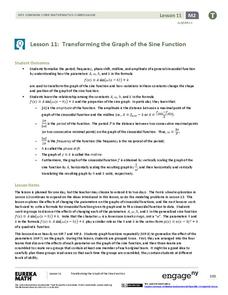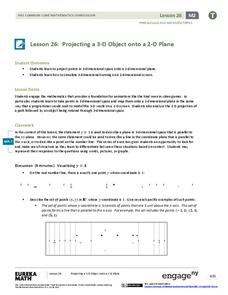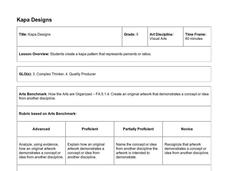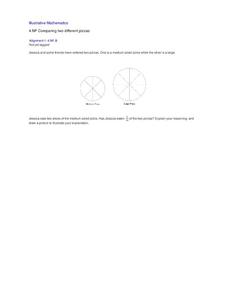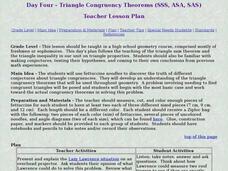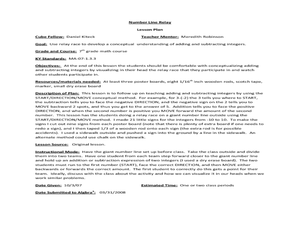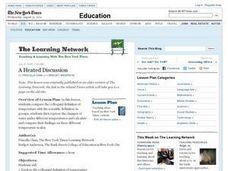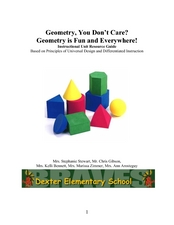EngageNY
Transforming the Graph of the Sine Function
Build a solid understanding of trigonometric transformations through exploration. Learners work in teams to analyze the effects of different algebraic components on the graph of a sine function.
Blogger
Standard Form of a Linear Equation
Organize your learners with this well-laid-out note-taking printable. Note blanks are organized to allow for two strategies of graphing an equation given in standard form.
Curated OER
Deal Me In
Middle schoolers study the components of a deck of cards and conduct an initial experiment in the probability of drawing various types of cards from a deck. They play two rounds of poker to discover the probability of drawing several...
5280 Math
Stories That Formulas Tell
Learn the stories a formula holds. An interesting lesson takes a unique approach to teach how to use formulas. Beginning with a formula, learners predict what the variables stand for and then use the formula to make calculations and tell...
EngageNY
Truncated Cones
Learners examine objects and find their volumes using geometric formulas in the 21st installment of this 25-part module. Objects take the shape of truncated cones and pyramids, and individuals apply concepts of similar triangles to find...
EngageNY
Piecewise and Step Functions in Context
Looking for an application for step functions? This activity uses real data to examine piecewise step functions. Groups create a list of data from varying scenarios and create a model to use to make recommendations to increase...
Virginia Department of Education
Composition of Functions
Analyze functions by decomposing complex functions and composing simple functions. Through a detailed lesson plan, pupils learn the vocabulary and notation related to the composition of functions. Practice includes both evaluating and...
EngageNY
Projecting a 3-D Object onto a 2-D Plane
Teach how graphic designers can use mathematics to represent three-dimensional movement on a two-dimensional television surface. Pupils use matrices, vectors, and transformations to model rotational movement. Their exploration involves...
EngageNY
Looking More Carefully at Parallel Lines
Can you prove it? Making assumptions in geometry is commonplace. This resource requires mathematicians to prove the parallel line postulate through constructions. Learners construct parallel lines with a 180-degree rotation and then...
Bowland
You Reckon?
Sometimes simple is just better. A set of activities teaches young mathematicians about using plausible estimation to solve problems. They break problems down to simpler problems, use rounding and estimation strategies, and consider...
Illustrative Mathematics
Converting Fractions of a Unit into a Smaller Unit
There is more than one way to answer a question; especially when you have fractions in measurement. Here are three questions with real-world situations in which 5th graders are asked to provide answers in three ways: a larger unit of...
Hawaiʻi State Department of Education
Kapa Designs
I always knew there was a connection between art and math, and this lesson proves it. Fifth graders will use what they know about ratios and percents to design art inspired by Polynesian kapa cloth. A grid, specific guidelines, and the...
Utah Education Network (UEN)
Geo Shapes
Invite your first graders to compose and decompose two and three-dimensional figures with this fun, hands-on lesson. They investigate and predict the results of putting together and taking apart two-dimensional shapes with rubber bands...
Illustrative Mathematics
Comparing Two Different Pizzas
What better way to learn about fractions than with a couple pizzas? Help Jessica figure out how much of the pizza she has eaten, while teaching your class that fractions refer to a specific whole amount. This problem will be challenging...
Curated OER
Triangles Congruency Theorems
Tenth graders investigate the theorems of ASA, AAS, AAA and ASA. In this geometry lesson plan, 10th graders discuss the theorems of triangles and how it is used to solve for missing sides or angles. They review how two angles are formed...
Curated OER
The Games Robots Play
Students learn about how robots are programmed to play games. They then construct robot applications (basic computer codes) for playing tic-tac-toe comprised of if-then logic sequences. Students then compete in teams using their...
Curated OER
Number Line Relay
Learners investigate the placements of numbers on a number line. In this algebra lesson, students visualise addition and subtraction on a number line.
Curated OER
Rock On
Students analyze trends in the Grammy Award winners this year and create graphs displaying their findings.
Curated OER
A Heated Discussion
Students compare the colloquial definition of temperature with the scientific definition. They, in groups, then explore the changes of water under different temperatures and calculate and compare their findings on three different...
Curated OER
Leonardo of Pisa and the Golden Rectangle
Students investigate geometry and algebra and the history behind these two interesting subjects. In this algebra lesson plan, students analyze the Fibonacci Sequence and relate it to solving exponential equations. There are alot of links...
Curated OER
Geometry is Fun and EverywhereGeometry, You Don’t Care? Geometry is Fun and Everywhere
Third graders investigate shapes in our world. In this geometry lesson plan, 3rd graders describe plane and solid shapes and identify angles, solid objects and lines of symmetry. Students use online resources, graphic organizers and...
Curated OER
Polynomials and Factoring
Students classify, add, subtract, and factor polynomials. In this polynomials lesson, students classify polynomials by creating their own system. During a discussion, the class decides on a common system. They add and subtract...
Curated OER
The Grouchy Ladybug
Young scholars learn about sorting and classifying objects by size while reading Eric Carle's "The Grouchy Ladybug". In this sorting and classifying lesson, students first listen to and interact with the story. They then look at cut-outs...
Curated OER
Let's Go Golfing
Students bring their visions for golf courses to life. For this scale model lesson, students research golf courses online, plan golf courses on grid paper, and then create scale models of the courses they planned.
